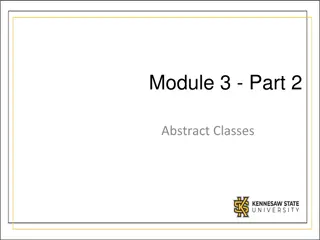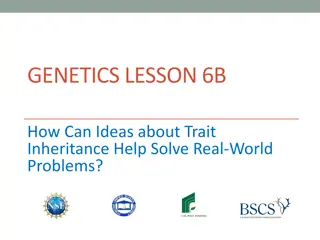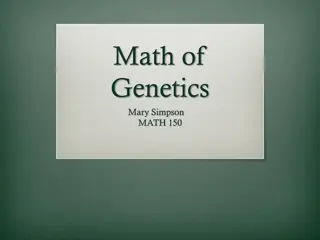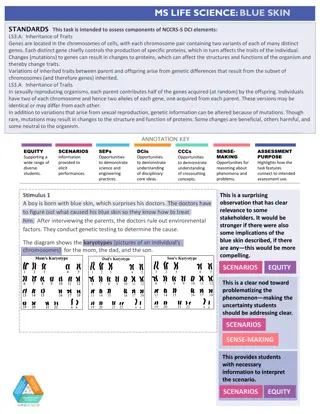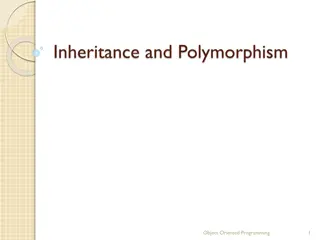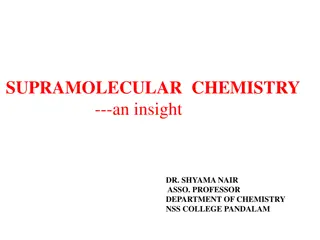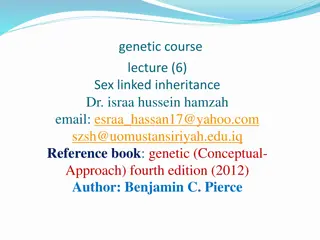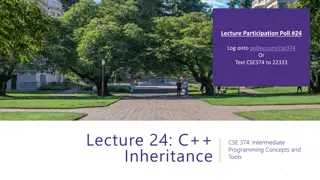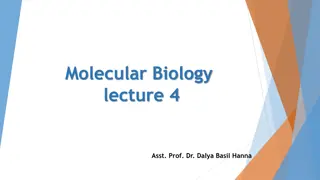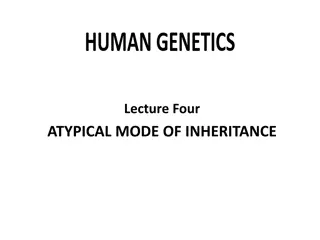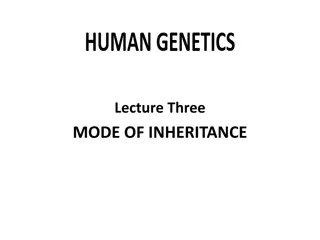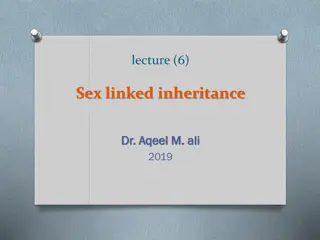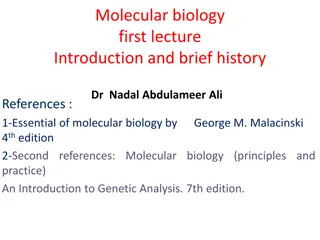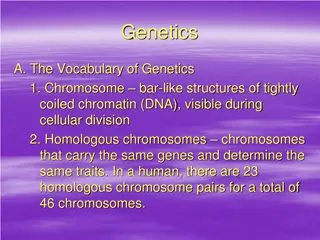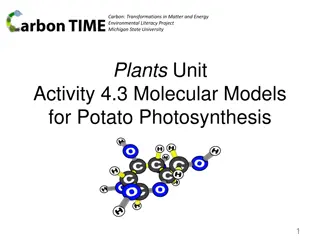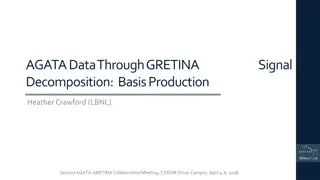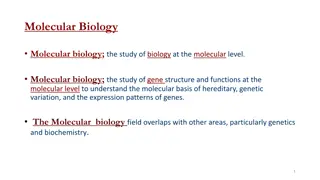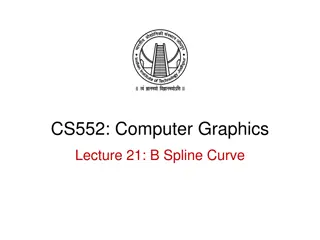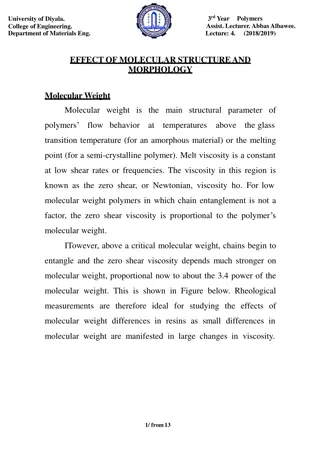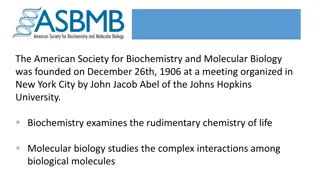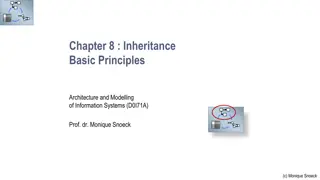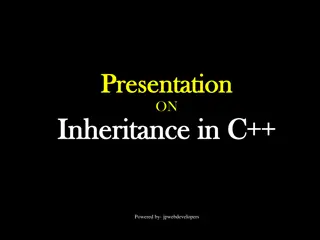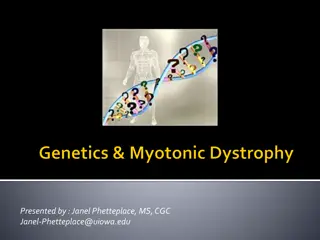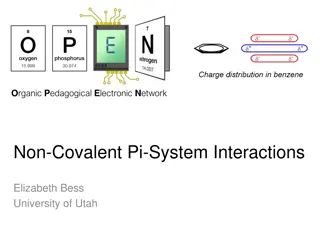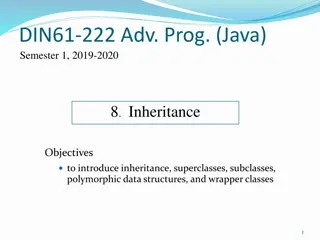Understanding Abstract Classes and Inheritance in Object-Oriented Programming
Inheritance in object-oriented programming allows for reusing proven and debugged high-quality software through abstract classes. Abstract classes serve as superclasses and cannot be instantiated, instead, they force child classes to implement specific methods. Concrete and abstract methods can coex
6 views • 15 slides
Understanding Trait Inheritance for Real-World Problem Solving
Discover how the study of trait inheritance in genetics helps solve real-world problems through examples like the Wilson family case study. Explore key concepts such as chromosomes, genes, alleles, dominant and recessive traits, and the Hansen family pedigree to grasp the significance of genetic inh
0 views • 13 slides
Exploring the Basics of Genetics and Inheritance
Understanding the fundamentals of genetics and inheritance, this content covers topics such as Mendelian genetics, gene inheritance, chromosomes, alleles, and Gregor Mendel's pioneering work. It delves into genetic outcomes related to multiple traits, linkage, dominance, Hardy-Weinberg equations, an
0 views • 87 slides
Understanding Inheritance of Traits Through Blue Skin Case Study
Assessing genetic inheritance and mutations using a case study of a boy with blue skin. The scenario highlights how genes control traits, the random assortment of chromosomes in offspring, and the impact of mutations on protein function. Students analyze karyotypes to infer genetic differences betwe
0 views • 6 slides
Understanding Inheritance and Polymorphism in Object-Oriented Programming
Inheritance in object-oriented programming allows the creation of new classes derived from existing classes, promoting code reuse. By extending a general superclass to specialized subclasses, developers can model different entities efficiently. However, it's crucial to understand when to use inherit
1 views • 61 slides
Exploring Supramolecular Chemistry: Insights and Applications
Supramolecular chemistry delves into the chemistry of molecular assemblies, intermolecular bonds, and non-covalent interactions, leading to the formation of supra-molecules through aggregation of molecular subunits. Concepts like molecular recognition, self-organization, and host-guest chemistry pla
0 views • 18 slides
Understanding Sex-Linked Inheritance: Key Concepts and Examples
Sex-linked inheritance refers to the transmission of genetic traits determined by genes located on the sex chromosomes. This type of inheritance differs from autosomal inheritance due to the unique characteristics of the X and Y chromosomes. In organisms with XX/XY sex determination, genes on the X
1 views • 21 slides
Intermediate Concepts in C++ Inheritance - Lecture Participation Poll #24
Explore the advanced topic of C++ inheritance through Lecture Participation Poll #24 in CSE 374. Dive into the concepts with examples and code snippets covering class inheritance, virtual functions, and more. Don't miss out on this opportunity to enhance your understanding of intermediate programmin
0 views • 31 slides
Understanding International Inheritance Tax Rules
In the realm of international property and succession law, different legal systems like Common Law and Civil Law govern how inheritance tax applies to individuals with assets in multiple countries. For French residents, navigating French succession tax on worldwide assets is crucial, while non-Frenc
2 views • 27 slides
Understanding Gene Mutations in Molecular Biology
Gene mutations play a significant role in molecular biology, leading to alterations in DNA sequences that can impact offspring. These mutations can arise spontaneously or be induced by various factors, such as mutagens. Understanding gene mutations is crucial for comprehending the genetic basis of c
2 views • 27 slides
Understanding Atypical Patterns of Inheritance in Genetics
Explore atypical modes of inheritance such as codominant traits, pseudodominant inheritance, mitochondrial inheritance, anticipation, pleiotropy, variable expressivity, heterogeneity, new mutation, and complex traits in genetics. Learn about codominance, pseudodominance, and atypical presentation of
0 views • 26 slides
Understanding Modes of Inheritance According to Mendel's Laws
Explore the fundamentals of genetics by assessing Mendel's laws of inheritance, understanding Mendelian inheritance bases, and defining various patterns of single-gene inheritance using family pedigrees and Punnett squares. Dive into the fascinating world of genotypes, Punnett squares, and laws of d
0 views • 29 slides
Understanding Sex-Linked Inheritance in Genetics
Explore the concept of sex-linked inheritance, where traits are determined by genes on sex chromosomes. Learn about X-linked and Y-linked characteristics, the patterns of inheritance in males and females, and examples of sex-linked traits like Hemophilia and Color blindness. Understand the implicati
1 views • 24 slides
Understanding Basis and Dimension in Linear Algebra
Basis and dimension are fundamental concepts in linear algebra. A basis is a set of vectors in a vector space that allows us to represent any vector by multiplying and adding the basis vectors. The dimension of a vector space is the number of elements in its basis. Linear independence, spanning sets
0 views • 13 slides
Understanding Genetic Inheritance: Traits, Expression, and Punnett Squares
Explore genetic inheritance through traits, gene expression differences between males and females, and Punnett square analysis. Discover the randomness of genetics, sex-linked, sex-limited, and sex-influenced inheritance, along with practical examples in animal breeding. Delve into genotypic and phe
1 views • 21 slides
Breast Cancer Survival Disparities by Molecular Subtypes in the US
Breast cancer molecular subtypes play a crucial role in determining survival outcomes. This study by Nadia Howlader, PhD, from the National Cancer Institute, presented the first nationally representative estimates of breast cancer survival by four main molecular subtypes. The research aimed to under
1 views • 23 slides
Understanding Basis and Dimension in Linear Algebra
Basis and dimension are fundamental concepts in linear algebra. A basis is a set of vectors that can represent any vector in a given space through linear combinations. The dimension of a vector space is determined by the number of elements in its basis. Linear independence, spanning, finite-dimensio
5 views • 13 slides
Introduction to Molecular Biology: Historical Insights and Key Experiments
Molecular biology is a field that focuses on understanding the behaviors of macromolecules like DNA, RNA, and proteins. This summary discusses the history of molecular biology, including the work of Friedrich Miescher and Griffith's experiment, which demonstrated the transfer of genetic material. Th
0 views • 19 slides
Understanding Electron Correlation and Basis Sets in Molecular Calculations
Polarized basis sets describe the electron density polarization in atoms and molecules to improve accuracy in computed geometries and frequencies. Diffuse basis sets are recommended for calculating electron and proton affinities. Electron correlations account for electron interactions in molecular c
0 views • 8 slides
Understanding Genetics: Chromosomes, Genes, and Inheritance
Genetics encompasses the study of chromosomes, genes, and inheritance patterns. Chromosomes are bar-like structures carrying DNA, with homologous pairs determining traits. Autosomes and sex chromosomes play roles in genetic makeup. Genes are hereditary units determining individual traits, with allel
0 views • 20 slides
Understanding X-Linked Inheritance and Diseases
X-linked inheritance involves genes on the X chromosome, leading to unique inheritance patterns and characteristics. X-linked diseases vary in expression between males and females due to differences in chromosome composition. X-linked dominant traits are rare but can have significant impacts on affe
1 views • 21 slides
Understanding Potato Photosynthesis: Molecular Models and Chemical Changes
Explore the process of photosynthesis in potato plants through molecular models and chemical changes at different scales, from atomic-molecular to macroscopic. Learn how potato plants produce food through biosynthesis and cellular respiration, connecting the atomic-molecular scale to the macroscopic
0 views • 23 slides
Understanding Molecular Vibrations in Vibrational Spectroscopy
Explore the world of molecular vibrations and their significance in vibrational spectroscopy. Learn about the different types of vibrations in diatomic and triatomic molecules, the concept of degrees of freedom, and how atoms change positions to create varying bond lengths and angles. Discover the r
0 views • 47 slides
Understanding Basis Set Generation in Computational Chemistry
Detailed explanation and control over defining basis set functions, species labels, number of shells, basis set generation procedures, and solving the Schrödinger equation for ion generation. Explore schemes for generating multiple basis sets and the impact of extra charge on orbital localization i
0 views • 17 slides
Evolution of Inheritance Law in European Legal History
Inheritance law, also known as succession, plays a significant role in the devolution of property to heirs upon the owner's death. The evolution of Roman Inheritance Law during the imperial period, competition between civil and pretorian law systems, and the process of succession are explored in det
0 views • 48 slides
Basis Production Procedure for AGATA through GRETINA Signal Decomposition
This presentation outlines the detailed procedure for generating basis signals in the context of AGATA data processed through GRETINA signal decomposition. It covers the generation of pristine basis signals, superpulse analysis, and the creation of cross-talk corrected basis files. The process invol
0 views • 19 slides
Exploring Molecular Biology and Cell Science
Molecular biology delves into the study of biology at the molecular level, focusing on gene structure and functions to comprehend hereditary traits, genetic variation, and gene expression patterns. Cells, the fundamental units of life, vary in shape and function but share basic structures. The Three
0 views • 31 slides
Understanding B-Spline Curves in Computer Graphics
Exploring the advantages of B-spline curves over Bezier curves, this content delves into the representation, calculation of basis functions, and properties of B-spline curves. The discussion includes issues with Bezier curve representation, local control in B-spline curves, and the subdivision of th
0 views • 11 slides
Understanding the Influence of Molecular Weight on Polymer Flow Behavior
Molecular weight plays a critical role in determining the flow behavior of polymers above their glass transition temperature or melting point. The zero shear viscosity of polymers is directly related to their molecular weight, with significant changes in viscosity observed even with small difference
0 views • 13 slides
Understanding Basis of a Set in Linear Algebra
A basis for a vector space V is an independent generating set. There are intuitive ways to confirm if a set is a basis, such as checking if it is independent and generates V. The dimension of V helps determine if a subset is a basis. Examples and methods like the extension theorem are explored to fi
0 views • 6 slides
The American Society for Biochemistry and Molecular Biology - Advancing Research in Life Sciences
Founded in 1906, the American Society for Biochemistry and Molecular Biology (ASBMB) is a prominent organization that explores the fundamental chemistry of life and intricate interactions among biological molecules. ASBMB publishes prestigious research journals covering various fields such as microb
0 views • 5 slides
Basic Principles of Inheritance in Information Systems
Understanding inheritance in information systems is crucial for designing efficient architectures. This chapter delves into the principles of inheritance, such as attribute and method inheritance, generalization, and subtype hierarchies. It also discusses the modeling of inheritance through UML nota
0 views • 71 slides
Understanding Inheritance in C++ Programming
Inheritance in C++ allows a class to inherit properties and characteristics from another class, forming a hierarchy of classes. Different types of inheritance include Single, Multiple, Multilevel, Hierarchical, and Hybrid Inheritance. Each type has its own unique way of deriving classes from existin
1 views • 9 slides
Understanding the Legal Rights of Inheritance in Rwanda
In Rwanda, the concept of inheritance, known as "Izungura," is governed by specific laws outlined in the Republic of Rwanda Law Reform Commission's Act of 2016. This legal framework determines the rights and responsibilities of individuals involved in the inheritance process, ensuring fairness and p
0 views • 28 slides
Understanding Inheritance in Object-Oriented Programming
Inheritance allows a class to inherit properties and characteristics from another class, promoting code reusability and reducing duplication. It is a fundamental feature in Object-Oriented Programming that enhances modularity and scalability by structuring classes hierarchically. Different modes and
0 views • 50 slides
Genetics and Inheritance: Insights and Options for Families
Explore the world of genetics and inheritance through a series of informative slides covering topics such as Myotonic Dystrophy, autosomal dominant inheritance, biological children donation/adoption, prenatal diagnosis, and preimplantation genetic diagnosis. Gain insights into genes, chromosomes, an
0 views • 14 slides
Understanding Non-Covalent Pi-System Interactions in Molecular Structures
Non-covalent interactions play a crucial role in chemical selectivity and molecular recognition. This article discusses the significance of Pi-system interactions, including Pi-Pi and Cation-Pi interactions, in stabilizing molecular structures like DNA helices and G-quadruplexes. Insights into molec
0 views • 6 slides
Polymer Molecular Weight Exercise Analysis
This exercise involves calculating the number average and weight average molecular weights, as well as the polydispersity index (PDI) for a sample of polystyrene composed of fractions with different molecular weights. The analysis includes determining the number of moles in each fraction, calculatin
0 views • 7 slides
Recent Developments in Inheritance Law Under the Inheritance (PFD) Act 1975
Explore recent case summaries and key aspects of the Inheritance (PFD) Act 1975, including reasonable financial provision, categories of claimants, court orders, factors for consideration, and notable cases like Ilot v. The Blue Cross. Learn about permissions to apply out of time, recent court decis
0 views • 35 slides
Introduction to Inheritance and Polymorphism in Java Programming
This course material covers the concepts of inheritance, superclasses, subclasses, polymorphic data structures, and wrapper classes in Java programming. It introduces the DoME example - a multimedia entertainment database, showcasing the implementation of classes like CD and DVD. The details of CD a
0 views • 54 slides
